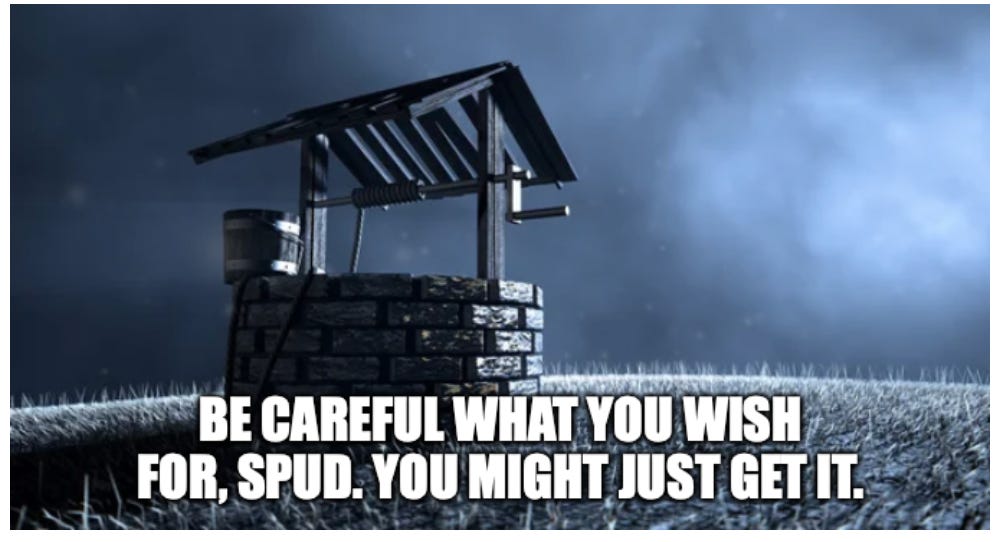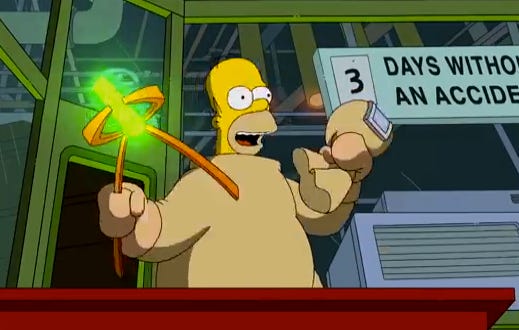Of all the shittiest, most disingenuous rhetorical askhole gambits in desperate need of some serious shut-the-fuck-up, “I’m just asking questions,” or “I just want a debate,” are the most fucking up-shuttable.
Somebody should tell Peter Dutton before I gets me any deeper into this column because…
Oops! Too late.
You will have noticed that whenever Dutts needs to avoid discussing ten years of coalition shitfuckery over climate change, he goes nuclear.
Does he really want this debate, though? (Spoiler, duh, no). He wants to avoid the other discussion about his party’s responsibility for melting icecaps, collapsing weather systems and our soon-to-be annual tradition of extinction-level mega-fires.
But we still have a little time before we all die screaming, so sure, let’s do the nuclear debate.
I haz talking points.
If you believe the science (over, say, the OpEd page of The Australian), you’d know we have about eight years of increasingly squeezy wiggle room left to get our emissions down. Under the best of circumstances—precluding, oh, I dunno, global pandemics, actual fucking war in Europe and disintegrating supply chains—a nuclear power plant averages ten years to build. Unless it takes longer and blows out in cost, which is a non-zero possibility when you’ve never built one before, you have no nuclear industrial base to support it. No qualified, security-cleared workers to build it.
So, when might these magical reactors come online, Spud? Before those magical nuclear submarines get here?
But let’s imagine some miracle happens, and you get to build your gently glowing antipodean Fukushima; how much is my power bill coming down again? Because apart from building a Dyson Sphere around the Sun, there aren’t many more expensive ways of generating electricity than in a nuclear power plant.
It costs about twice as much as gas and coal and four times as much as solar and wind. The fuel, of course, isn’t free like it is with solar and wind. You have to dig it up and refine it, transport it, and then store it safely for tens of thousands of years once it’s been used up – which takes about 18-24 months.
That’s why 30 of France’s 56 nuclear reactors are offline right now. Partly it’s scheduled maintenance. Sending this guy in to change the rods.
And partly, it’s unscheduled, unexpected repair and upkeep, which happens when critical systems like coolant pipes corrode. These are more or less the predictable unpredictables.
Less predictable?
Russian artillery shells raining down around your atomic facility, as is happening right now at several nuclear plants in Ukraine. Or the seabed suddenly quaking to send a tsunami wave train into your central reactor.
If Dutts had this debate, instead of continually calling for it, he might argue that it’s unfair to single out extreme, one-off cases. But the point is that bad things happening to nuclear plants are extreme black swan events, and they’re not really one-offs because they keep happening in one form or another. The precautionary principle suggests we might be better off not building them in the first place.
But what about this climate thingy you keep going on about, says Dutts? Nuclear plants might occasionally vent a little bit of deadly radioactive content into the atmosphere, soil, or ocean, but by crikey, they’re carbon-free.
True, sort of.
But this cycles back to cost and reliability.
The only nuclear power project under construction in the US, a pair of Westinghouse AP1000 reactors at the Volte Plant in Georgia, has doubled in cost from US $14 billion to more than US $28 billion. And these guys have been building nukes for decades. They have the institutional knowledge, industrial base and workforce we lack entirely. And even with that advantage, they can’t deliver one of these fucking things on time and within budget.
So yeah, you could blow forty or fifty billion, or more, on building your first shiny new plant powered by the might atom.
Or you could spend that money on proven technology like solar, wind and battery storage, all of which can be built at scale within months, not decades.
If you want this debate, perhaps start by explaining why you wouldn’t do that.
Not only would it have de-carbonising benefits for the climate, but it would also flow into economic and strategic outcomes. Victor Abramowicz argues at the Lowy Institute’s site that “a large investment to accelerate the transition to renewables, including by domestic production of large scale solar, would further enhance local manufacturing and help save the planet. It would also diversify the grid to the point of near impunity to attack, with security benefits for our whole economy.”
All for the cost of less than one magical nuclear power plant.
You have the floor, Mister Dutton.












I love the nuclear (fusion) reactor that we already have. It's a nice, safe, 150 million km away, so the energetic-photon collectors that harvest the energy don't have to keep being replaced from neutron flux degredation.
Oh, and its existing fuel supply has been estimated to be good for at least another three billion years or so.
A decent response to the Potato. Of course the one delightful aspect of nukes that gives Spud a hard-on is that it's centralised power to millions, thus a worthy fiefdom for a Mr Burns style wannabe like Darth Kipfler.